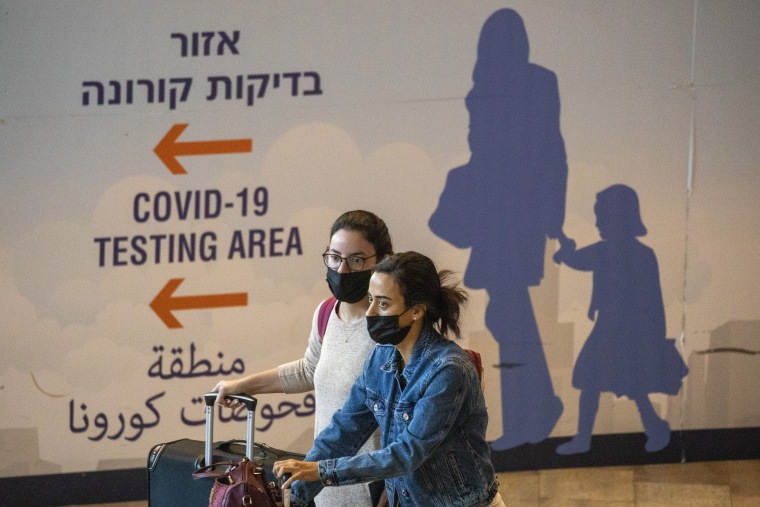Israel on Sunday became the first country to ban the entry of all foreigners as the world races to understand and contain the worrying new variant of Covid-19 that was identified in southern Africa. The government also promised to use controversial phone-tracking technology to track and find cases of the new omicron variant of the coronavirus.
Japan's prime minister, Fumio Kishida, followed suit Monday by reestablishing entry restrictions for foreign travelers in order to "avoid the worst-case scenario," he said. The restrictions, relaxed earlier in the month, will return Tuesday, Kishida said during a press conference.
The Moroccan government said it would prohibit direct flights to the kingdom starting late Monday.
Although no cases of the new variant have been detected in the U.S., the government’s leading infectious disease expert, Dr. Anthony Fauci said mutations displayed by the omicron variant indicate that it may be highly transmissible and able to escape the body’s immune response, including the protection rendered by antibodies induced by the vaccines.
"This is a clarion call, as far as I’m concerned, of saying let’s put aside all of these differences that we have and say, 'If you’re not vaccinated, get vaccinated,'" Fauci said on NBC News' "Meet the Press" Sunday.

He praised South African officials for releasing timely information about the variant.
"We have an advantage of this, we have an up on it, we know what’s going on, we’re getting more information in real time," Fauci said, later adding: "When you diminish, or stop, or block travel from a particular country, there's a reason for that. It’s to give you time to do things."
The U.S. has restricted travel from South Africa and seven neighboring countries effective Monday. But Fauci and other experts have said the variant could already be in the U.S.
Dr. Kavita Patel, NBC News’ medical contributor, said: "It’s already here. We know from previous variants that by the time we pick it up in Africa and the European Union, it’s already likely."
On Sunday, health officials in the Canadian province of Ontario said two people who had recently been in Nigeria have tested positive for the variant.
While there is still little understanding about the variant and how virulent it can be, a South African doctor who treated early cases of it said Sunday that the symptoms she had seen were “extremely mild” and that countries could be “panicking unnecessarily.”
Dr. Angelique Coetzee told the BBC that she had first encountered the variant in patients who had fatigue, aches and pains but no cough or change in sense of smell or taste. “We haven’t admitted anyone,” she said, but she acknowledged that understanding of the variant was still developing.
Officials in Israel, which has confirmed one case of the variant and suspects seven more, announced that they were barring foreign travelers from all countries and mandating quarantine for all Israelis arriving from abroad. The ban is expected to last for 14 days, Prime Minister Naftali Bennett said in a statement.
Bennett’s office also said Shin Bet, Israel’s internal security agency, would activate cellphone monitoring to track and find verified cases of the new variant.
The technology has been used on and off since the beginning of the pandemic, matching virus carriers’ locations against those of other people’s mobile phones nearby to determine with whom they had come into contact. Israel’s Supreme Court this year banned the sweeping use by the government of mobile phone tracking of coronavirus carriers amid privacy concerns from civil rights groups.
European countries, meanwhile, are reintroducing restrictions and curfews in a surge in coronavirus cases.
Within days of the World Health Organization’s raising the alarm about the new variant, omicron cases were detected across Europe, including in the U.K., the Netherlands, Italy, Germany and Belgium, as well as in Australia, Israel and Hong Kong.
Dutch health officials Sunday identified 13 omicron cases among passengers who flew in on two flights from South Africa on Friday after 61 of them tested positive for Covid-19.
The U.K., which suffered one of the worst outbreaks in Europe, has also identified two cases of the new variant. Prime Minister Boris Johnson announced Saturday that people arriving in the U.K. would be asked to take tests on the second day and must self-isolate until they provide negative test results. He also said face coverings will be made compulsory in shops and on public transport.
The speed and extent of that travel bans that numerous countries imposed on people arriving from South Africa and other countries in the region has prompted dismay in some quarters.
The measures are "akin to punishing South Africa for its advanced genomic sequencing and the ability to detect new variants quicker," the South African Foreign Ministry said in a statement. "Excellent science should be applauded and not punished."
The WHO has also cautioned against hastily imposing travel restrictions, saying countries should take a "risk-based and scientific approach."
As the world went on high alert over the weekend, U.S. Secretary of State Antony Blinken praised South African scientists for their "quick identification" of the new variant. In a statement Saturday, he also lauded the South African government for its "transparency in sharing this information," which he said should serve as a model for the world.
The omicron variant was first reported in South Africa on Wednesday.

